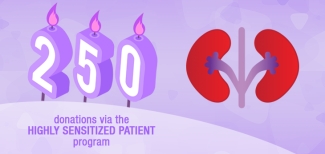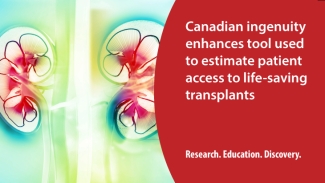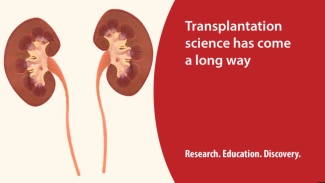Two hundred and fifty donations facilitated through the Highly Sensitized Patient program
We are pleased to share the news of an exciting milestone for the Highly Sensitized Patient program. As of Monday, Aug. 22, 2016, there have been 250 transplants since going live in October 2013!

The Highly Sensitized Patient (HSP) program is a national organ sharing program operated by Canadian Blood Services in collaboration with all provincial donation and transplant programs The program gives provincial transplant programs access to a larger national pool of kidney donors for highly sensitized patients who need a more specific donor match.
“The program exemplifies excellent collaboration with provincial partners,” says Kim Young, Director, Donation and Transplantation, Canadian Blood Services. “HSP provides greater access and opens up a national pool of donors making it more likely that these patients will proceed to transplant.”
The implementation across Canada began in October 2013 and by November 2014, all provinces and territories had joined the HSP program. The provincial and territorial Ministries of Health and provincial organ donation organizations worked together to implement the HSP program.
What does being highly sensitized mean?
It means that the patients have a sensitized immune system. Immune system sensitization may be a result of blood transfusions, previous transplants or pregnancies, which is why many highly sensitized patients are women. As a result, patients who are “highly sensitized” are at higher risk of rejecting an organ transplant. This makes it very difficult to find a suitable donor match.
How does the program help sensitized patients?
The HSP program makes it more likely that people who need a kidney transplant, and are hard to match, will find one. The program uses sophisticated technology to match the right kidney to the right patient anywhere in Canada with accuracy and efficiency.
An organ matched through the HSP program reduces the risk of potential rejection. This means highly sensitized patients have improved chances that:
- their body will accept the new organ;
- the organ will last longer; and
- they will not end up back on a waitlist.
The collaboration with provincial testing laboratories is part of the national advisory structure organized by Canadian Blood Services, unique to Canada and is foundational to the success of the program.
Why was the HSP program developed?
Approximately 20 per cent of patients on provincial waitlists are highly sensitized and in need of a kidney transplant. Yet, these same patients historically receive less than one per cent of available organs. With access to a limited number of donors in their home province, highly sensitized patients wait much longer for a kidney transplant and have a greater chance of becoming more ill or dying while they wait. By providing access to donors across the country, the HSP program increases the chances of finding kidney transplants for these hard-to-match patients.
Quick Facts
- The HSP program is for patients needing very specific matches from deceased kidney donors. Through the HSP Program, this group of patients now has access to a larger national donor pool, dramatically increasing the chance of a match.
- Women are disproportionately highly sensitized due to antibodies developed during pregnancy.
- More than 4,500 people are waiting for organ transplants in Canada today; however, only a fraction of Canadians are registered to donate. While many Canadians are aware of the need for organ transplants, there remains a shortage of donors.
- For every 1,000,000 Canadians, about 15 people become deceased organ donors each year. Canada’s organ donation and transplant rate lags behind other developed nations.
Further reading:
Transplantation science has come a long way
Canadian ingenuity enhances tool used to estimate patient access to life-saving transplants
Canadian Blood Services – Driving world-class innovation
Canadian Blood Services promotes leading practices and is actively involved in raising awareness and education of organ and tissue donation and transplantation. We maintain patient registries and help save and improve lives though research and innovation and by working closely with the organ and tissue donation and transplantation community.
The opinions reflected in this post are those of the author(s) and do not necessarily reflect the opinions of Canadian Blood Services.
Related blog posts
A new innovation by a team of Canadian Blood Services researchers and the National HLA Advisory Committee has improved the situation for Canadian transplant patients. Launched in April 2012, the Canadian cPRA Calculator was developed to support Canadian Blood Services’ transplant programs. It’s a...
Transplanting organs, tissue or stem cells from one person to another saves lives. It was not easy to figure out what facilitates a healthy and successful transplant though. Efforts over a long time reveal the complexity of the procedure and that very specific circumstances are required. As researchers’ understanding of the immune system improved, so did the success rate of transplants.

